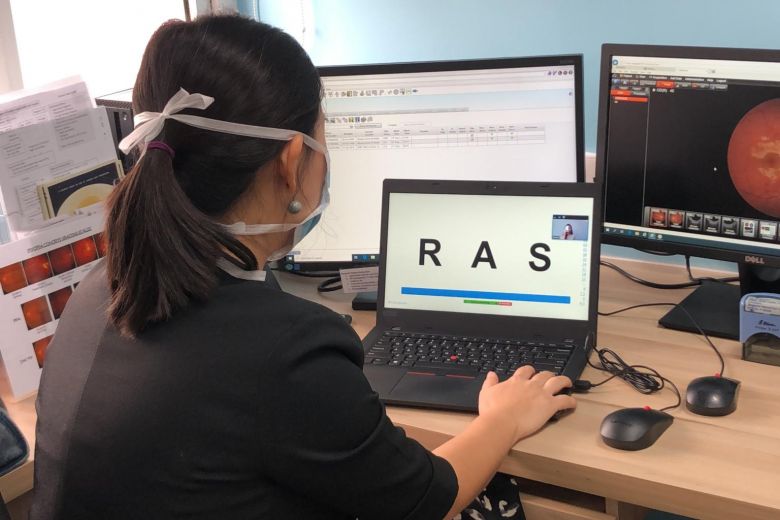
Singapore National Eye Centre consultant Loh Kai-Lyn conducting a visual acuity test for her patient online. PHOTO: SINGAPORE NATIONAL EYE CENTRE
SINGAPORE - Lifestyle changes brought on by the Covid-19 pandemic could aggravate the progression of myopia in some, according to researchers at the Singapore National Eye Centre (SNEC).
Working from home or attending classes online have increased digital screen time for many, as well as increased their frequency of near-work and limited their outdoor activities, said the report that was published in July.
However, the effects of the pandemic on myopia rates and individuals with myopia may be felt only decades later, said Associate Professor Marcus Ang, clinical director of SNEC's Myopia Centre.
"Myopia is a slow, progressive condition. That's why we are anxious and strict about detecting it early on," said Prof Ang at a virtual event on Tuesday (Sept 15) to mark the centre's one-year anniversary.
He added that the risk of developing myopia is highest for children between five and seven, and that they are most receptive to behavioural changes, making it important to educate them then rather than later in their lives.
One of the Myopia Centre's efforts to educate this age group is a children's book, and it was read by Foreign Minister Vivian Balakrishnan to children from seven PCF Sparkletots centres across Singapore during the event.
The book is the second in the centre's "Amanda the Panda" series, which follows the adventures of a young panda learning about eye care practices.
Published by Wildtype Books, it will go on sale at bookstores soon.

Children from PCF Sparkletots Childcare Centre @ Cashew listening to Foreign Minister Vivian Balakrishnan read the newly launched book "Amanda the Panda: Goes to the City". PHOTO: PCF SPARKLETOTS PRESCHOOL
he Myopia Centre is also finding new ways to cater to its patients. It aims to launch tele-consultations as part of its regular operations from January.
Said Prof Ang: "It was serendipitous that Covid-19 came and allowed us to reach our patients, as the virtual consultations were already in the works before the pandemic hit."
From now till January, more tests will be done to ensure that the video-assisted evaluation techniques used by doctors for the online tele-consultations will consistently yield accurate results.
Asked if he was concerned about the increased screentime children are getting, Dr Balakrishnan, himself an ophthalmologist and a former medical director of the SNEC, said: "Yes I am very worried.
"All of us, especially our children, need to have a balanced life. We need to spend time outdoors, we need to take frequent breaks from reading or from the screen, we need to engage in sports, we need to engage in social development."
Get the Health Buddy App
© 2025 SingHealth Group. All Rights Reserved.













 Get it on Google Play
Get it on Google Play